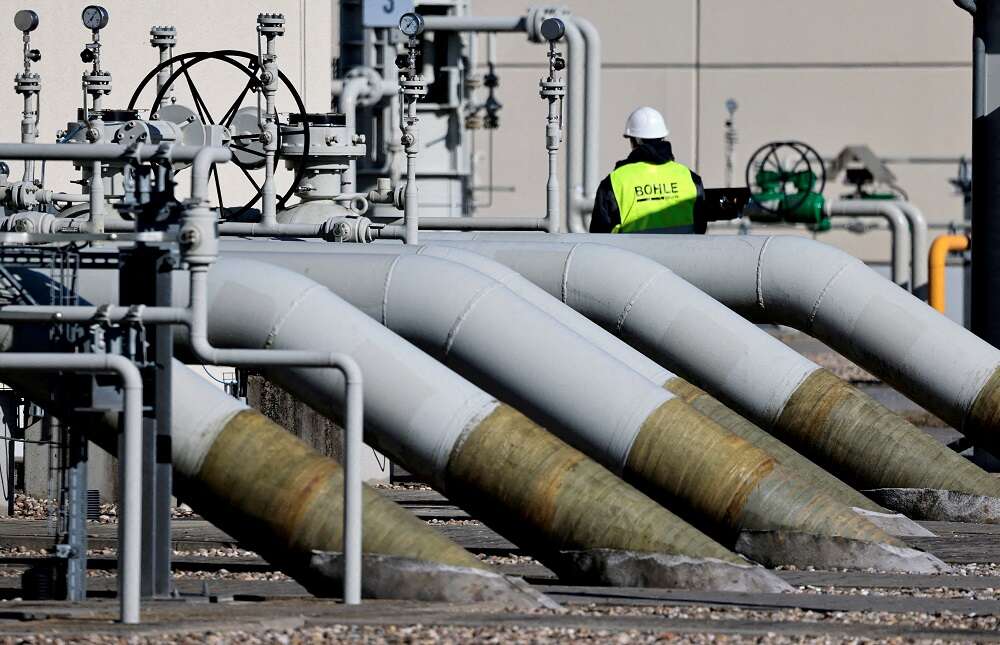
By Kate Abnett and Ingrid Melander
BRUSSELS (Reuters) -Fossil fuel firms may have to share their excess profits to help European households and industries cope with red-hot energy bills, a draft European Union plan showed on Monday as the cost of the West’s “energy war” with Russia took a growing toll.
Energy prices and inflation have surged as Moscow slashed gas supplies in response to Western sanctions imposed over its actions in Ukraine, prompting France to tell consumers they would have to share some of the pain while Britain is among countries facing the threat of recession.
The draft European Commission proposal, which is expected to be unveiled this week, would see the 27 EU countries introduce a ‘solidarity contribution’ for the fossil fuel industry.
Oil, gas, coal and refining companies would have to make a financial contribution based on taxable surplus profits made in the 2022 fiscal year, according to the draft, which could still change and will then need to be approved by EU governments.
“Those profits do not correspond to any regular profit that these entities would or could have expected to obtain in normal circumstances,” the draft EU plan, seen by Reuters, said.
BP and Shell had no immediate comment. TotalEnergies did not immediately respond to a request for comment.
The proposals are also expected to include a life-raft for power firms facing a liquidity crunch. But countries are split over the details and whether to impose a cap on the price they pay for gas, diplomats said. Russia has said it would cut all supplies if a cap on its gas was introduced.
Meanwhile, across Europe companies and governments scrambled for ways to tackle the crisis.
‘IRRESPONSIBLE’
In France, Finance Minister Bruno Le Maire said consumers would be protected by new caps on energy prices when current ones run out this winter although there would be some increases as it would be “completely irresponsible to put the burden … solely on the state budget”.
In neighbouring Spain, Iberdrola said it would guarantee gas and power supply for five months to customers deemed vulnerable by the Red Cross, after which all outstanding bills must be paid.
Italy’s main business lobby group Confindustria said it was in talks with the government about how any potential gas rationing would take place.
With the EU seeking to diversify its energy supply Finland’s Gasgrid said it aimed to begin importing liquefied natural gas (LNG) via a planned floating terminal in January.
Separately, the EU’s securities watchdog said it was “actively considering” potential measures to ease strains in energy markets where some participants face difficulties in finding enough cash to cover positions.
In Britain, where inflation has hit a 40-year high of more than 10%, the economy expanded by 0.2% in July compared to June, less than the 0.4% expected. The sharp climb in energy costs hurt demand for electricity and a leap in the cost of materials hit the construction sector.
A “disappointingly small rebound in real GDP in July suggests that the economy has little momentum and is probably already in recession,” said Paul Dales at Capital Economics.
‘TOO LITTLE GAS’
As the European Commission drafts the new series of EU measures, Norway warned against gas price caps.
“A maximum price would not solve the fundamental problem, which is that there is too little gas in Europe,” Norwegian Prime Minister Jonas Gahr Stoere said after a call with European Commission President Ursula von der Leyen.
Norway, which is a close ally of the EU, has become the bloc’s largest supplier of gas after Russia cut back exports in the wake of the Ukraine war, giving it record income from its petroleum industry as prices soared.
EU ministers have already backed away from a price cap targeting only Russian gas, which accounted for around 40% of the bloc’s gas before its invasion of Ukraine. That share has plummeted to 9%, as Moscow cut supplies, blaming technical issues caused by sanctions.
‘UNPREDICTABLE’
Meanwhile, Russia said it was hard to predict the consequences for gas transit to Europe of a new arbitration process initiated by Ukraine energy firm Naftogaz.
Naftogaz said on Friday Gazprom had not paid it for gas transportation through Ukraine on time or in full.
“There could be a lot of unpredictable things from both our Western colleagues and the leaders of Ukraine’s gas industry,” Kremlin spokesman Dmitry Peskov said.
Natural gas flows from Russia to Europe along key routes were steady on Monday, while the Nord Stream 1 pipeline remained shut.
Oil prices rose as Iranian nuclear talks appeared to hit obstacles and an embargo on Russian oil shipments loomed, with tight supply struggling to meet still robust demand.
(Reporting by Reuters bureaux; Writing by Ingrid Melander; Editing by Alexander Smith, Kirsten Donovan)


